




Washing clothes for a newborn baby requires careful consideration, as their delicate skin is more sensitive to different fabrics and detergents. One important factor to keep in mind is the temperature at which you wash their clothes.
When it comes to washing newborn clothes, it is generally recommended to use warm or cool water. Hot water can cause the fabrics to shrink and fade, and may also irritate the baby’s skin. It’s best to avoid using hot water, especially for items made of delicate fabrics such as wool or silk.
It is worth noting that using cold water for washing newborn clothes may not effectively remove stains and bacteria. In order to ensure cleanliness, warm water is usually the preferred temperature.
Some parents opt to use special baby detergents that are specifically formulated for sensitive skin. These detergents are typically milder and have fewer additives, making them less likely to cause skin irritation. Regardless of the detergent you choose, it is important to thoroughly rinse the clothes to remove any remaining soap residue.
The temperature at which you wash newborn clothes not only affects their cleanliness, but also their durability. By following the recommended temperature guidelines and properly caring for the clothes, you can ensure that they stay soft, comfortable, and safe for your baby.
Importance of Washing Newborn Clothes
Washing newborn clothes before dressing your baby is an essential step that should not be overlooked. Here are a few reasons why it is important:
-
Maintain cleanliness: Newborns have delicate and sensitive skin that requires extra care. Washing their clothes ensures that any dirt, dust, or chemicals from the manufacturing process are removed, reducing the risk of skin irritation or allergic reactions.
Top RatedMolly's Suds Baby Laundry Detergent PowderGentle on newborn clothes and skinThis fragrance-free detergent is extra gentle for newborns and made from earth-derived ingredients. Each pack provides up to 120 loads of clean laundry, ensuring safety and effectiveness. -
Eliminate germs and bacteria: Newborn babies have a weaker immune system, making them more susceptible to infections. Washing newborn clothes helps to remove any bacteria or germs that may be present, keeping them clean and hygienic.
-
Softening fabrics: Many newborn clothes are made from fabrics that may feel rough or stiff when they are brand new. Washing them before use helps to soften the fabric, making it more gentle and comfortable against your baby’s skin.
-
Prevent skin irritation: Newborns often have sensitive skin that can easily become irritated. Washing their clothes with gentle detergents that are free from harsh chemicals and fragrances can help prevent skin irritation, rashes, or eczema flare-ups.
It is recommended to wash newborn clothes using a gentle detergent specifically designed for babies. Washing at a temperature of 30-40 degrees Celsius is generally sufficient to remove dirt and germs without causing damage to the fabrics. It is important to check the care labels on the clothing for any specific washing instructions.
By washing newborn clothes before dressing your baby, you can ensure their safety, comfort, and overall well-being. Taking this simple step helps to create a clean and healthy environment for your little one.
Choosing the Right Temperature
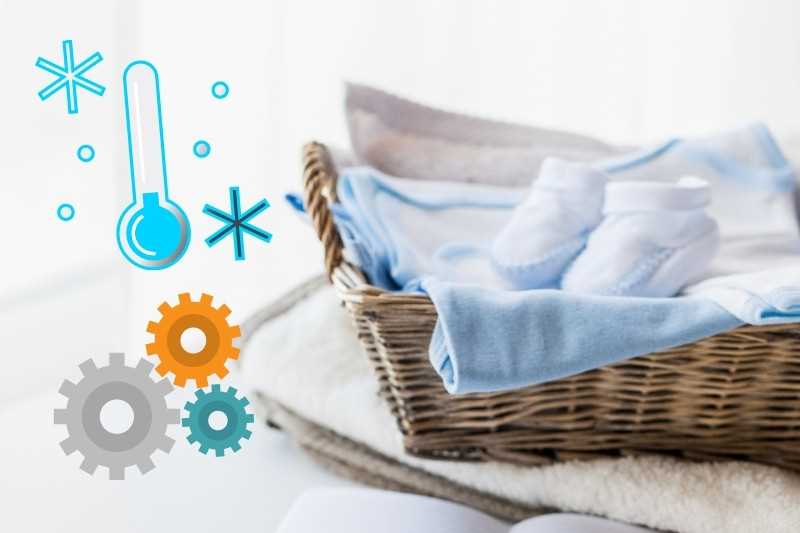
When it comes to washing newborn clothes, it’s important to choose the right temperature to ensure the clothes are clean and safe for your baby. Here are a few factors to consider when deciding on the temperature:
1. Fabric Care Instructions
Before washing any garment, always check the care instructions on the label. Some fabrics may require specific temperature settings or even hand washing. Follow the instructions provided to avoid damaging the clothes.
2. Dirtiness of the Clothes
The level of dirtiness plays a significant role in choosing the right temperature. If the clothes are heavily soiled or stained, higher temperatures may be necessary to effectively remove dirt and stains. However, for clothes that are not very dirty, lower temperatures can still provide adequate cleaning.
3. Baby’s Skin Sensitivity
Newborns have delicate skin that can be easily irritated. Washing clothes at high temperatures may cause the fabric to become rough or shrink, which can lead to discomfort for your baby. To ensure your baby’s comfort, it’s advisable to choose lower temperatures when possible.
4. Consider a Gentle Cycle
If you are washing newborn clothes in a washing machine, consider using the gentle cycle. This setting is designed to be more gentle on fabrics and can help preserve the quality of the garments. It usually utilizes lower temperatures and slower agitation, which is ideal for baby clothes.
5. Temperature Recommendations
As a general guideline, it’s recommended to wash newborn clothes at a temperature between 30°C (86°F) and 40°C (104°F). This range is typically sufficient to remove dirt and stains without causing any damage or discomfort. However, always refer to the specific fabric care instructions to ensure the best results.
| Type of Fabric | Recommended Temperature |
|---|---|
| Cotton | 30°C (86°F) |
| Wool | 30°C (86°F) – 40°C (104°F) |
| Synthetic | 30°C (86°F) – 40°C (104°F) |
By choosing the right temperature when washing newborn clothes, you can ensure that your baby’s garments are clean, safe, and comfortable for them to wear.
Ensuring Hygiene and Safety
When it comes to washing newborn clothes, ensuring hygiene and safety is of utmost importance. Here are some tips to help you achieve that:
1. Separate newborn clothes from other laundry
It’s important to keep your baby’s clothes separated from the rest of the laundry to avoid any potential contamination. Newborns have delicate skin and can be more susceptible to irritation or allergic reactions.
2. Use mild, baby-friendly detergents
Choosing the right detergent is crucial for your baby’s sensitive skin. Opt for mild, hypoallergenic detergents that are specifically designed for newborn clothes. Avoid using strong chemicals or fabric softeners that may cause skin irritation.
3. Wash newborn clothes before first use
It’s recommended to wash all newborn clothes before they are worn for the first time. This helps remove any chemicals, dirt, or bacteria that may be present from the manufacturing process and transportation.
4. Follow the care instructions on the clothes
Each piece of clothing may have specific care instructions, such as the recommended water temperature, cycle, and drying method. Always follow these instructions to maintain the quality of the clothes and ensure they are properly cleaned.
5. Use appropriate water temperature
Generally, washing newborn clothes in warm water (around 30-40°C) is sufficient to remove dirt and bacteria while being gentle on the fabric. However, it’s best to check the care instructions on the clothes to determine the recommended temperature.
6. Avoid using strong detergents or bleach
Harsh detergents, bleach, or stain removers should be avoided when washing newborn clothes. These can irritate your baby’s skin and may leave behind residue even after rinsing.
7. Dry clothes thoroughly
Make sure to dry newborn clothes thoroughly to prevent the growth of mold or mildew. You can air dry them outside or use a dryer on a low heat setting. Avoid excessive exposure to direct sunlight to prevent any potential fading of colors.
8. Store washed clothes in a clean, dust-free environment
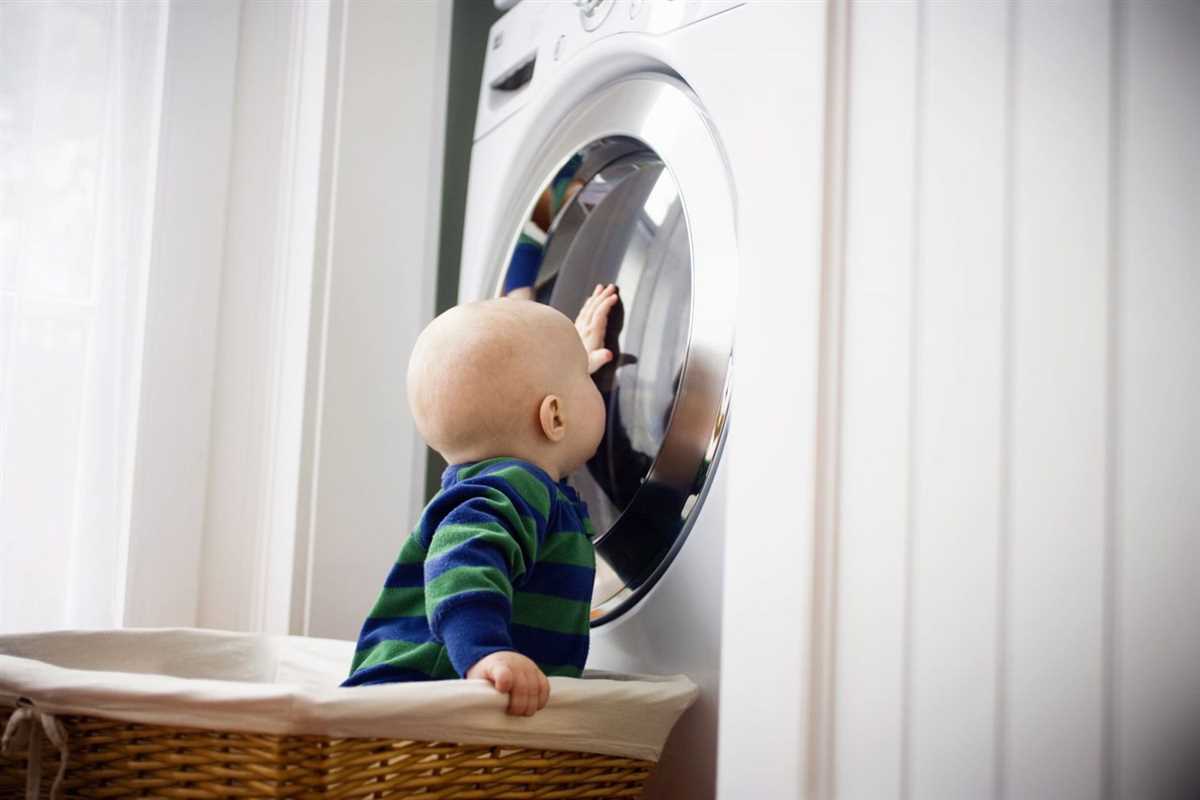
After washing and drying the clothes, store them in a clean and dust-free environment, such as a drawer or a wardrobe. This helps maintain their cleanliness before they’re ready to be worn by your newborn.
By following these hygiene and safety tips, you can ensure that your newborn’s clothes are clean, safe, and comfortable for them to wear.
Avoiding Skin Irritation
- Choose gentle detergents: When washing newborn clothes, it is important to select a gentle detergent that is specifically formulated for baby clothes. These detergents are typically free of harsh chemicals and fragrances which can cause skin irritation.
- Wash before first use: It is recommended to wash newborn clothes before they are worn for the first time. This helps to remove any residue or chemicals that may be present on the clothes, reducing the risk of skin irritation.
- Avoid fabric softeners: Fabric softeners can leave a residue on clothes that may irritate a baby’s sensitive skin. It is best to avoid using fabric softeners when washing newborn clothes.
- Wash separately: Washing newborn clothes separately from adult clothes can help prevent any cross contamination. Adult clothes may contain allergens or irritants that can cause skin irritation in babies.
- Avoid excessive washing: While it is important to wash newborn clothes regularly, excessive washing can cause unnecessary wear and tear on the fabric. This can lead to rougher textures that may irritate the baby’s delicate skin.
- Choose the right water temperature: When washing newborn clothes, it is best to use warm water instead of hot water. Hot water can be harsh on a baby’s skin and may cause irritation. However, it is always important to follow the care instructions on the clothing label.
By following these tips, you can help prevent skin irritation and keep your newborn comfortable in their clothes.
Preserving the Quality of Clothes
When washing newborn clothes, it is important to use the right temperature to preserve their quality. Here are some tips to ensure that your baby’s clothes remain in great condition:
1. Sort Clothes by Color
Before washing the clothes, it is advisable to sort them by color. This helps to prevent color bleeding and ensures that each item is washed at the appropriate temperature.
2. Follow Care Labels
Care labels provide important information on how to correctly wash the clothes. They usually indicate the recommended temperature and any specific instructions on washing, drying, or ironing. It is essential to follow these instructions to maintain the garment’s quality.
3. Use Gentle Detergents
Using mild and gentle detergents specifically designed for baby clothes can help preserve their quality. Harsh detergents may cause damage to the fabric or irritate your baby’s delicate skin.
4. Wash at the Right Temperature
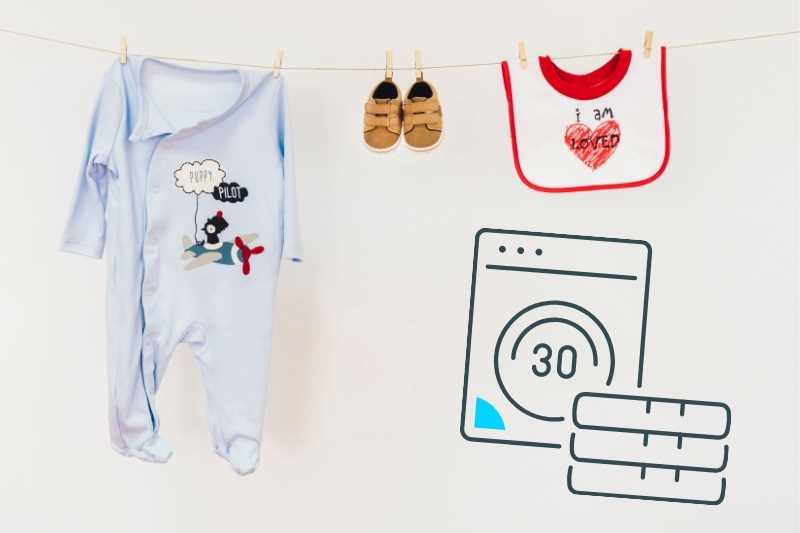
The ideal temperature for washing newborn clothes is usually between 30-40 degrees Celsius (86-104 degrees Fahrenheit). This temperature range is effective in removing stains and dirt while being gentle on the fabric.
5. Avoid Overloading the Washing Machine
It is important not to overload the washing machine when washing newborn clothes. Overcrowding the machine can prevent proper circulation of water and detergent, leading to poorer cleaning results and potential damage to the clothes.
6. Consider Using a Mesh Bag
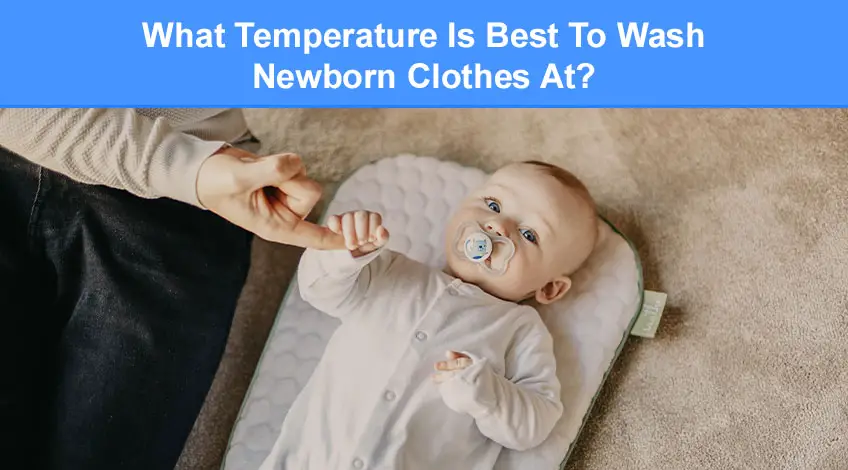
Using a mesh laundry bag can provide an extra layer of protection for delicate garments. This is especially useful when washing items with buttons, zippers, or delicate embroidery.
7. Air Dry Whenever Possible

Whenever possible, air drying newborn clothes is the best option to preserve their quality. Direct sunlight can fade colors, so it is advisable to dry them in a shaded area. If using a dryer, choose a gentle setting and avoid over-drying to prevent shrinking or damaging the fabric.
8. Store Clothes Properly
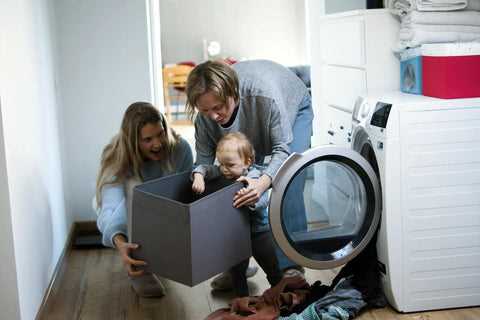
After washing and drying, folding baby clothes neatly and storing them in a clean and dry place will help maintain their quality. Avoid storing them in damp areas, as moisture can lead to mold or mildew growth.
By following these tips, you can help ensure that your baby’s clothes remain in excellent condition and last longer.
Tips for Washing Newborn Clothes
1. Separate Clothes
It’s important to separate the newborn clothes from the rest of your laundry. This helps to prevent any potential contamination or cross-contamination with other clothing items.
2. Pre-wash the Clothes
Before washing the newborn clothes, it’s a good idea to pre-wash them. This helps to remove any manufacturing residues or chemicals that may be present on the clothes.
3. Use a Gentle Detergent
Newborn skin is sensitive, so it’s recommended to use a gentle detergent that is specifically designed for baby clothes. Avoid using strong detergents or fabric softeners that may irritate the baby’s skin.
4. Choose the Right Water Temperature
For most newborn clothes, a warm water temperature (around 30°C) is usually sufficient. However, it’s best to check the care instructions on the clothes’ labels to ensure you are using the appropriate water temperature.
5. Avoid Harsh Wash Cycles
Avoid using harsh wash cycles, such as heavy-duty or prolonged cycles, as they can be rough on the delicate fabric of newborn clothes. Instead, opt for shorter and gentler wash cycles.
6. Consider Hand Washing
If you have particularly delicate newborn clothes or items made from special fabrics, you may want to consider hand washing them. This can help preserve the quality and extend the lifespan of the clothes.
7. Hang Dry or Use Low Heat
To avoid shrinking or damaging the newborn clothes, it’s best to hang dry them or use the lowest heat setting on your dryer. This helps to maintain the shape and integrity of the garments.
8. Iron at Low Temperatures
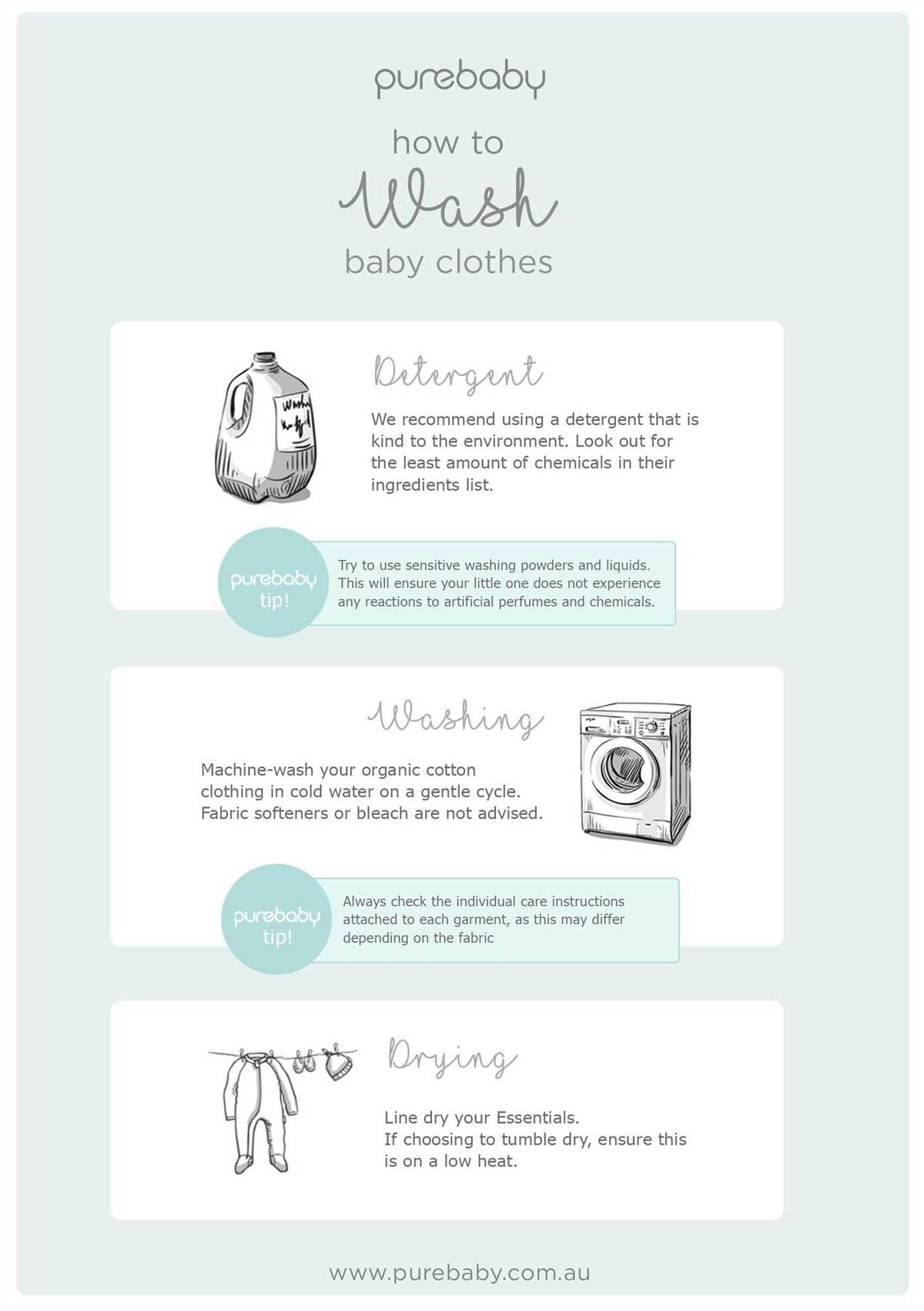
If necessary, iron the newborn clothes at low temperatures to remove any wrinkles. Be sure to check the care instructions on the labels to determine the appropriate ironing temperature for each garment.
9. Store Clean Clothes Properly
Once you have washed and dried the newborn clothes, store them in a clean and dry place. This helps to keep the clothes free from dust, dirt, and other contaminants.
10. Wash Newborn Clothes Separately
Remember to continue washing newborn clothes separately from the rest of your laundry even after the initial wash. This helps to maintain the hygiene and cleanliness of the clothes.
By following these tips, you can ensure that your newborn’s clothes are clean, safe, and comfortable for them to wear. Always prioritize the baby’s comfort and well-being when caring for their clothing.
FAQ
What temperature should I wash newborn clothes at?
You should wash newborn clothes at a temperature of 30-40 degrees Celsius. This helps to kill most germs and bacteria while still ensuring that the clothes are clean and safe for your baby.
Is it necessary to wash newborn clothes separately?
It is recommended to wash newborn clothes separately, especially during the first few months. This helps to avoid any potential skin irritations or reactions caused by detergent residue or other substances that may be present on adult clothes.
Can I use regular detergent for washing newborn clothes?
It is best to use a mild and fragrance-free detergent specifically designed for newborn clothes. Regular detergents may contain harsh chemicals and fragrances that can irritate your baby’s delicate skin.
Can I wash newborn clothes in hot water?
It is not recommended to wash newborn clothes in hot water as it can cause shrinkage or damage to the fabric. Stick to a temperature of 30-40 degrees Celsius for optimal cleaning and safety.
Do I need to sterilize newborn clothes before washing?
It is not necessary to sterilize newborn clothes before washing them. Washing them at the recommended temperature and using a gentle detergent will effectively remove any dirt, germs, or bacteria.
What temperature should I wash my newborn’s clothes at?
You should wash your newborn’s clothes at a temperature of 40 degrees Celsius or below.












